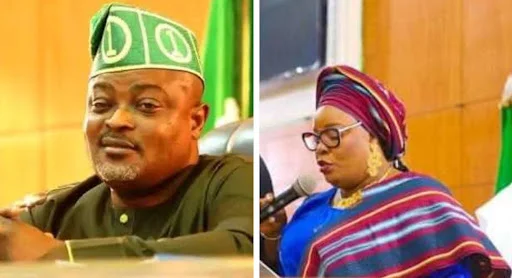By Mohammed Bello Doka
The political storm rocking the Lagos State House of Assembly has taken a dramatic turn, with reports suggesting that President Bola Ahmed Tinubu has intervened decisively to reinstate former Speaker, Mudashiru Obasa, as the legitimate leader of the legislative body. However, key lawmakers have swiftly denied the claims, dismissing them as "fake news" aimed at destabilizing the House.
The Power Struggle
The crisis began on January 13, 2025, when Obasa was ousted by 32 lawmakers, with accusations of gross misconduct and abuse of office leveled against him. In his place, Mojisola Meranda was elected Speaker, a move that triggered resistance from Obasa and his loyalists, who insisted the removal was politically motivated.
Since then, the battle for control has escalated, drawing intervention from high-ranking party officials. According to sources quoted by Vanguard, the Governance Advisory Council (GAC), the APC’s decision-making body in Lagos, has been instructed to rally support behind Obasa. Political heavyweights, including individuals with influence over the executive arm of the state government, have reportedly been tasked with ensuring his reinstatement.
One insider claimed, "The President has personally reached out to GAC members, urging them to pressure their loyalists in the Assembly to support Obasa. Those with political ties in the executive arm have also been enlisted to facilitate his return.”
Another source disclosed that the Bisi Akande-led committee, initially tasked with resolving the leadership dispute, was abruptly disbanded after submitting findings that allegedly favored the anti-Obasa faction. This, according to political analysts, is a clear indication of presidential involvement in the matter.
Lawmakers Deny Presidential Interference
However, these reports have been met with strong denials from lawmakers backing Meranda. A member of the Lagos Assembly, speaking to Vanguard, labeled the alleged directive as “a fabrication designed to cause confusion.” He added, "The Assembly is an independent arm of government. The President has not issued any such order, and we remain focused on legislative duties under Speaker Meranda.”
This denial is supported by other lawmakers who argue that no official directive has been communicated to them regarding Obasa’s reinstatement. Despite these denials, sources claim that intense lobbying is ongoing behind closed doors.
Legal Battle And Heightened Security
Meanwhile, Obasa has refused to concede defeat, choosing to challenge his removal in court. He has filed a lawsuit against Meranda and 36 lawmakers, describing his removal as illegal and unconstitutional. The case, currently before Justice Yetunde Rukayat Pinheiro of the Lagos High Court, is set for a crucial hearing on March 7.
In response to the ongoing crisis, the Assembly leadership has ordered legislative staff and aides to work remotely, citing security concerns. A memo signed by Acting Clerk Babatunde Abubakar emphasized the need for caution, warning that tensions remain high.
What Next?
With both factions refusing to yield and conflicting narratives emerging, the battle for the Lagos Assembly leadership is far from over. Insiders suggest that if political maneuvering fails, the matter may be settled in court—a process that could drag on for months, if not years.
For now, one thing is certain: the Lagos Assembly crisis has not only exposed deep political divisions but has also tested the influence of President Tinubu in state politics. Whether Obasa will reclaim his position or whether Meranda’s camp will successfully resist external pressure remains a matter of intense speculation.


